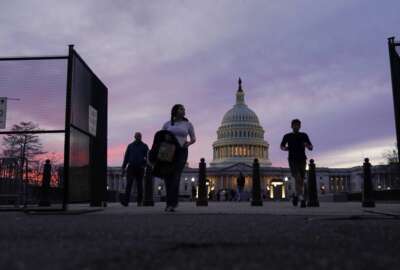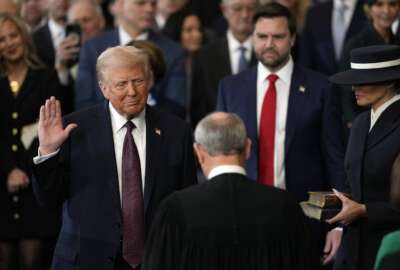
Congress will get some fresh bait to fight over this week
Congress will be particularly partisan this week. It's the week of the State of the Union Address, with a governor and former Trump administration press spokeswoman...
Congress will be particularly partisan this week. It’s the week of the State of the Union Address, with a governor and former Trump administration press spokeswoman giving the response to President Joe Biden. Fun. For more of what’s going on, the Federal Drive with Tom Temin spoke with Bloomberg Government Deputy News Director Loren Duggan.
Interview transcript:
Tom Temin
I guess the State of the Union is a good time for each of the parties to lay out their agendas or relay them out. So it does have a clarifying effect on where the battles will be, doesn’t it?Loren Duggan
It definitely does. And once a year that gather in a chamber and hear from the President. That’s going to be a different reception for him than the last two that he’s given, where he was with a Democratic Congress with Nancy Pelosi (D-Calif.) over one of his shoulders. This time, it’ll be Kevin McCarthy (R-Calif.) with whom he had, what seemed to be a cordial meeting net last week. But you it’s a new reality that he faces, a set of proposals that aren’t going to be welcomed by the party in control of the House. But definitely kind of the kickoff for the year ahead, including budget battles, which are going to be one of the key things going into the debates that will happen for the next several months.Tom Temin
Right, because the budget battle now has become intertwined with the fact of the debt ceiling, which has not been resolved. And so they’re really hard to separate those two issues. I think the Democrats would like to separate them. But the Republicans are seeing that as a point of leverage.Loren Duggan
Right. These are three separate questions that Congress faces on different timelines. One is annual funding, which the appropriations process is all about. And the budget, that’s sent up sometime in March, will lay out the administration’s visions there. But then there’s the debt limit, which is really about paying the bills that you’ve already incurred with everything you’ve passed into law. And then there’s mandatory spending programs, many of which operate on autopilot and they don’t look at that often, or maybe here or there. They take a look at the way some of these programs work. All these are going to be intertwined. And do you agree to a debt limit increase, only if there’s changes to mandatory spending? Only if there’s caps on discretionary spending? All those things are kind of a soup right now that they’re dealing with all at once. Even if some of the bigger decisions may not be made till later in the year on things like, what to fund the Pentagon at starting Oct. 1 or something like that.Tom Temin
Yeah. All right. Well, that’s a long term debate, that’ll pause for a couple of hours and then continue again, or that will be the catalyst for continuation. What else is going on though? There is a bill on vaccine requirements for foreign visitors?Loren Duggan
That’s right. So the House has been taking aim at some of the policies put in place during the pandemic. Last week, they voted to end the public health emergency, and the national emergency and try to end pandemic telework rules. But this week, the one that they’re bringing up, is to end a requirement that people coming in from abroad have a vaccine. So this is one of the policies that was put into place, one of the, lingering aspects of the pandemic policies, and that’s one that the House is looking to get rid of. It’s not clear that any of these things that have been passed in the House are going to be taken up by the Senate. But it’s a way for the House to continue to chip away at what they see as the return to normal that they want to see, the Biden administration agree with and change policies about.Tom Temin
Right, that bill to return telework to pre-pandemic levels that was put forth by a Rep. Comer (R-Ky.). That’s probably not going to go anywhere, because it passed the House, correct. But the Senate will take up a thing like that, so far as we can tell.Loren Duggan
So far as we can tell, that won’t come up. You could see if they got a bill on the floor and had an open amendment process, maybe they’ll take a vote on something like that. At least one senator, Roger Marshall (R-Kan.), who has been successful in the past to getting the Senate to vote on ending the national emergency. He may try to use the rules that exist in law and in the Senate books, to force a vote on that at some point. As we know, the Biden administration said that emergency is going to come to an end on May 11, under their new schedule. So might be a moot point whether or not they vote on that. But that’s the one where there are some procedural tools that give the minority in this chant, in this case, a chance to potentially force a vote. If everything lines up correctly.Tom Temin
We’re speaking with Loren Dugan, deputy news director at Bloomberg Government. And there is at least one judicial pick in the work and I think Sen. Cotton (R-Ark.) has threatened to hold up all judicial nominations.Loren Duggan
Right. So this is one of the things that the Senate is looking at doing this year. And the Senate Judiciary Committee last week churned out a number of nominees that were sent up last year, didn’t get through the finish line and had started over again. But the the thing about nominations, is it only takes a simple majority to push those through, there’s no 60 vote requirements. So even if a senator says he’s gonna hold it up, the majority, if they stay united, can push those through and over the line. As long as they have 50 votes and maybe the Vice President to come and break a tie. So it may slow things down. They may not get agreements to expedite things, but this is a top priority for the Biden administration and for Majority Leader Schumer (D-N.Y.), and Majority Whip Durbin (D-Ill.), who by the way, is also the Judiciary Chairman. So he has a lot of sway when it comes to that.Tom Temin
Sure. And getting back to the house they are looking at to D.C. laws, from the city council, have become the law of the city, recently. One is on voting, to let anyone who’s been in the city for 30 days, regardless of where they came from, including, the Kremlin or something, could vote in D.C. elections. And the other was the overhauling of the Criminal Code, not sitting well with Republicans on the Hill either.Loren Duggan
No, it’s not. And this is one of the things when Congress set up a government in D.C. under the D.C Home Rule act, they gave themselves the authority to overrule D.C. laws. That’s often not invoked, but this is a case where House Republicans are going to use that law that’s on the books to try to challenge these two laws. And I suspect we’ll hear a lot in particular about the crime one, just given some of the statistics around D.C. and some of the interests there. But again, these are some things that may be difficult to bring up in the Senate and the Biden administration may not want to overrule the D.C. government. But this is one of the facts of life in Washington, D.C. and the way it’s set up and the way that the laws are setting up self government for D.C. do give Congress the opportunity, if they wish to overturn this by passing a joint resolution. So kind of an unusual thing. We haven’t seen it for a while, but something that will dominate some floor debate.Tom Temin
It seems like the House is having vote after vote on different bills that probably won’t become laws, because it’s the opposite of what the Senate wants to do. The Senate doesn’t seem to be generating much in the way of new legislation at the moment. And it’s going to be confined, it sounds like to what it can do, and that is passed on judicial nominations. Have I got it right? Anything else happening up there?Loren Duggan
That’s been sort of the pace. So far, the house has had a lot of votes on a lot of bills that what have we, as we’ve said here, are unlikely to get through the Senate. The Senate really hasn’t had many votes at all. They just set up their committees on Thursday of last week. So they can start this week to get those up and running and start generating some bills and some more nominees out of there. But there are some tentpole bills that we’ll see action on the [Federal Aviation Administration (FAA)] reauthorization, the Farm Bill. There’s already some start, some talks and hearings around both of those issues. So there will be some legislation there, the appropriations process, some version of it will happen. But this early period, at least, it’s a lot of messaging bills, things that were ready to go is what the House Republicans called them initially, although even some of those they ended up not bringing up in the end. So I think this is a prelude to what we’ll see the rest of the year. But there are some things that have to get done. And when they get closer to those, I think we’ll see more substantive action on those things.Tom Temin
Yeah, there was a little bit of moonlight and roses breaking through, as you said in that meeting between House Speaker Kevin McCarthy and President Biden. And they were not saying they’ll agree, but they were saying they wouldn’t tear each other’s throats out. I guess that’s what constitutes progress in today’s Washington?Loren Duggan
Absolutely. It’s the first meeting of many and he speaks for his conference. But as we saw the conference may not always go along and may have some other ideas too. So, but a good first meeting is a good first step.
Copyright © 2025 Federal News Network. All rights reserved. This website is not intended for users located within the European Economic Area.
Tom Temin is host of the Federal Drive and has been providing insight on federal technology and management issues for more than 30 years.
Follow @tteminWFED
Related Stories




